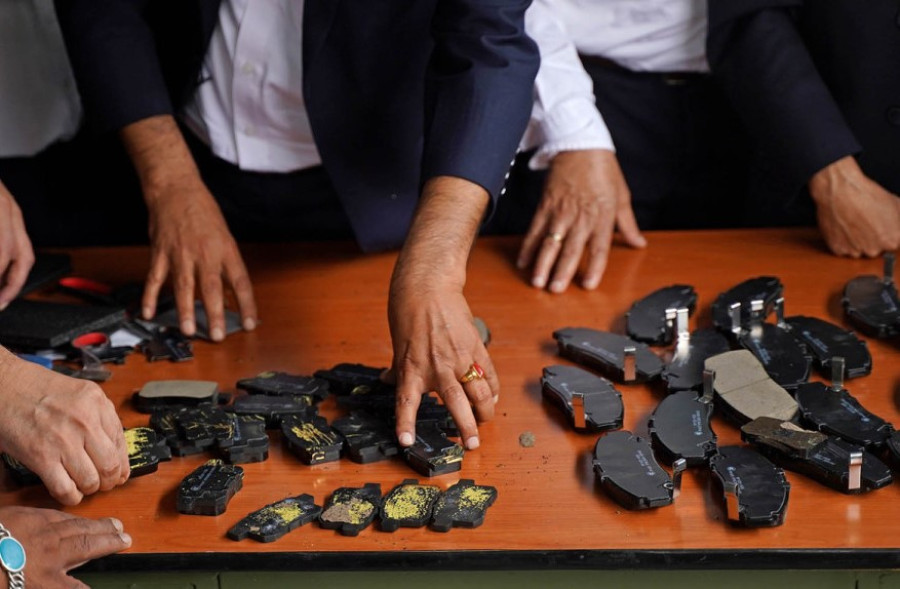Columns
How much corruption is too much?
Corruption at the highest echelons of government is nothing new in Nepal.
Paban Raj Pandey
On May 12, at an investment conference, Prime Minister Pushpa Kamal Dahal vowed to improve the investment climate in Nepal. Odds are that he was just paying lip service to the crowd he was addressing. Many decision makers—elected and non-elected both—have made similar promises in the past, yet foreign direct investment remains subdued. If, say, Dahal is serious this time, one way he could help create an investment-friendly environment is by helping create a society where corruption is looked down upon. Globally, Nepal ranks very high in corruption. For foreign investors, corruption and the associated bribes constitute a hidden cost—a stealth tax—which raises project and/or operational costs.
Corruption can be defined differently. While it does take place within private enterprises, corruption at the most basic level can be described as the abuse of public power for the benefit of self or related individuals. Corruption has been ingrained in human society for ages in one way or the other. Nations at the lower rung of the economic development ladder are more prone to this, but the developed ones are not immune either. South Korean President Park Geun-hye was impeached on corruption charges and sentenced to 25 years in prison. Similarly, French President Nicolas Sarkozy was sentenced to three years for corruption and influence peddling. Several United States senators have been found guilty of accepting bribes.
In 2022, no country scored a perfect 100 in Transparency International’s corruption perceptions index, but countries like Denmark (90), Finland, and New Zealand, where public apathy toward corruption is deep-rooted, scored high. In the United States, paying bribes to foreign officials is a criminal act, and bribery is one of two crimes explicitly mentioned in the Constitution which could lead to the impeachment of a president. In countries like Nepal (34), where corruption is pervasive, the cost of not paying bribes is lost contracts. In contract bidding, only the most efficient ones can offer the highest bribe. This is a deterrent for most foreign capital, which will then go to countries where these costs are lower.
Step in the right direction
Because of these supply-demand dynamics, what transpires in Nepal on the fake Bhutanese refugee case should be viewed as a step in the right direction. Nepalis apparently paid millions each in bribes to be settled abroad in the guise of Bhutanese refugees. This had the blessings of prominent government officials. Corruption at the highest echelons of government is nothing new in Nepal. What is new is the speed at which investigations are progressing and how the accused have been put behind bars. Thus far, the police have nabbed 16 individuals, including former deputy prime minister and energy minister Top Bahadur Rayamajhi, former home minister Bal Krishna Khand and former home secretary Tek Narayan Pandey.
The Dahal administration is likely acting with new-found enthusiasm because it involves foreign powers. Under the UNHCR programme, nearly 113,000 Bhutanese refugees of Nepali ethnicity were resettled in eight countries, including the United States. Soon after the news broke that the police were on the hunt for suspects, including Rayamajhi, the leaders of the three main parties—Dahal of the Communist Party of Nepal (Maoist Centre), KP Sharma Oli of the CPN-UML, and Sher Bahadur Deuba of the Nepali Congress—met. Rayamajhi, until his recent suspension, was secretary of the UML and a Maoist before that, while Khand is a central working committee member of the Nepali Congress.
Public perception was that the three top leaders hurriedly huddled together in an attempt to sweep the crime under the carpet. Many corrupt acts have gone unpunished in the past. In 1990, when the multi-party system was restored, one of the oft-repeated slogans of the new parties was to get rid of corruption prevalent in the preceding one-party Panchayat system. More than three decades have gone by, and corruption has only grown. Some major scandals surround the Baluwatar and Lalita Niwas land grab scandal, procurement of medical supplies, wide-body aircraft and security printing press. The public learns about the corruption only to discover that the authorities never followed through. Overlooking corruption breeds more of it.
Writing on the wall
The current anti-corruption commitment shown by the government—not to mention the police—is an exception. Dahal, who leads a 10-party coalition government, has said he will get to the bottom of this, no matter who is involved. The incumbent home minister, Narayan Kaji Shrestha, who is from his party, is a man with no family, which probably suggests he is free from the shackles of nepotism—à la the late Krishna Prasad Bhattarai of the Congress. A whole lot is riding on how all this evolves. If this ends the way it began, a new chapter—a constructive one—will be written in the annals of corruption.
It is likely that Dahal, Deuba and Oli have seen the writing on the wall. The level of frustration of the general public over corruption is soaring; they are protesting where they most efficiently can–at the ballot. The journalist-turned-politician Rabi Lamichhane-led Rastriya Swatantra Party (RSP) made waves in last year’s general election, winning 20 federal seats in the Lower House. In the last month’s by-elections, Lamichhane and Swarnim Wagle, who left Congress to join the RSP, won—from Chitwan and Tanahun, respectively. They represent the new blood of leaders fully aware of the damage wrought by years of corrupt practices and of the need to say, “Enough is enough.”
If the three major parties mess this one up, it will be an open invitation to the likes of the RSP to do very well in the next election cycle. If the case reaches the Supreme Court, the top court must rise to the occasion. In fact, in the last two years, the apex court has done so at least three times—when quashing Oli’s attempt to dissolve the Parliament twice and when rebuffing the then finance minister Janardan Sharma who had suspended Nepal Rastra Bank governor Maha Prasad Adhikari. The fight against corruption cannot be won in just a few years. A strong foundation will be laid once politicians start giving up a life of luxury and laws are in place to protect/reward whistle-blowers.




 11.12°C Kathmandu
11.12°C Kathmandu















